Environmental Sentencing: Its Bark Is Worse Than Its Bite — Should We Care?
 I have a new paper on SSRN about the sentencing of environmental offenders. The title is “Bark and Bite: The Environmental Sentencing Guidelines after Booker.” Using date collected by the United States Sentencing Commission, I show that judges sentence below the range recommended by the federal sentencing guidelines in an unusually high percentage of environmental cases, approaching sixty percent in some years.
I have a new paper on SSRN about the sentencing of environmental offenders. The title is “Bark and Bite: The Environmental Sentencing Guidelines after Booker.” Using date collected by the United States Sentencing Commission, I show that judges sentence below the range recommended by the federal sentencing guidelines in an unusually high percentage of environmental cases, approaching sixty percent in some years.
Many environmentalists are apt to bristle at the apparent demonstration that federal judges are “soft” on environmental crime. Given how little the government must prove to get an environmental conviction, however — prosecutors need not show either harm to the environment or an intent to harm the environment — I am not convinced that judges really are devaluing the environment through their sentencing decisions. Still, I think the data warrant a rethinking of the environmental guidelines in order to give them more credibility with judges.
Here is the abstract:

